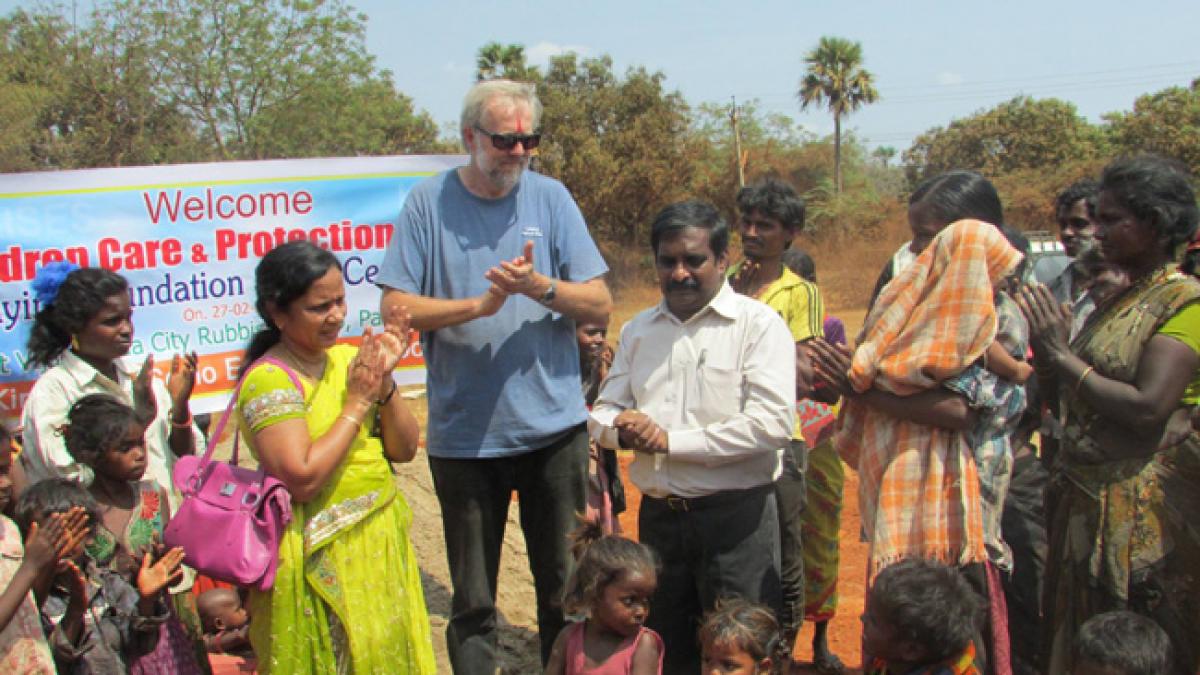Live
- Gadwal Remembers Labor Leader Balgopal Reddy on His Second Death Anniversary
- International Women’s Day 2025: Why is it Celebrated on March 8?
- Gadwal District Gears Up for NEET UG - 2025: Collector Ensures Top-Quality Exam Arrangements
- Naxalism has now given way to urban Naxalism in India: PM
- BJP ranks erupt in celebrations over MLC victory
- Massive fire breaks out at scrap godown in Bahadurpura
- Homestay facilities in tribal areas to boost tourism
- Cabinet green signals SC sub-categorisation
- 'Chintan Shivir' in Hyd to draft roadmap for 2028 Olympics
- Dy CM Bhatti lays foundation stone for road expansion
Just In
Plan to end child labour at Vijayawada municipal dumpyard closer to reality


A plan to bring an end to child labour at the Vijayawada municipal dump-yard has moved a step closer with the go-ahead of building work on a new Child Care & Protection Centre at Pathapadu.
A plan to bring an end to child labour at the Vijayawada municipal dump-yard has moved a step closer with the go-ahead of building work on a new Child Care & Protection Centre at Pathapadu.
Husband and wife Shoury Babu Rebba and Rajani Suram, whose charity KISES (Kiranmayi Socio Educational Society) was formed 17 years ago to represent the most marginalised and underprivileged members of society, invited 40 families currently living on the Vijayawada dump to attend a foundation stone-laying ceremony at the site of a new temporary school.
As part of a ground-breaking humanisation programme, KISES, supported by volunteers in the UK, are building a classroom, play area, kitchen and creche facility for around 60 children as they seek to use education as a way out of crippling poverty for the dump dwellers.
The unskilled, uneducated families, are forced to pick through mountains of waste for plastic and metal items to sell for recycling, facing a daily battle for survival, many beset by health problems and malnutrition.
Thanks to KISES, they will be relocated to a new tented village, built on ground donated by local landowner Mr Omkar Reddy, and for the first time will have access to clean water, sanitation, toilets and washing facilities, as well as solar lighting and food and health programmes.
The puja, which was followed by a celebration meal for all the families, was attended by KISES UK volunteer Jem King, who thanked Mr Reddy for his generosity in donating and preparing the land for building work to begin and praised the small KISES India team for reaching out to the regularly shunned and overlooked dump dwellers.
“Many of the children living and scavenging at the dump have never seen the inside of a classroom, so this humanisation scheme will be truly life-changing for them,” said Jem, a 55-year-old father of three from Cardiff, Wales. “These are some of the world’s most vulnerable and downtrodden people who, despite all their difficulties, seem to retain a remarkably optimistic and carefree outlook on life.
“They simply accept this lifestyle as their lot, but the elders have nevertheless been quick to recognise this opportunity and the chance for the children, many of whom were born on the city tip, to have a brighter future away from the dangers of the dump.
“Those already in their late teens might find attending school too challenging, but KISES will still seek out vocational and skills training for them, while giving the younger children a vital introduction to the world of learning.
“In time, it should be possible to integrate them into the Indian education system, either in government-run schools, or special residential schools set up to offer support to some of the most severely disadvantaged children in the Andhra Pradesh region.”
Jem and fellow UK volunteer Meriel Woodward, from Lancashire, England, have taken on fundraising responsibility for several KISES projects - the dump humanisation programme being the first priority - and are actively seeking corporate sponsorship in Britain and beyond.
Individual donations and an ‘adopt a dump family’ campaign have so far raised more than £4,000 (INR400,000), allowing building work to commence. However, more funding is urgently required to complete the tented village, which will enable all children and families to move off the dump.
“For now, we see this as a one-off project, but in the longer term this KISES scheme could serve as a template for other cities to follow and bring lasting change to the absolute poorest of the poor,” says Jem.
“If India is serious about raising living standards for all its citizens and alleviating poverty throughout the land then what better way than to build from the very bottom up?
“Putting the caste system aside, if families like these can be integrated into wider society and go on to live worthwhile and productive lives, that sends out the message that every citizen counts - and that can only be good for the future of India.”
If you think you might be able to help by donating goods, money, or providing corporate sponsorship, please get in touch with Shoury and Rajani in India at [email protected], telephone: (+91) 94405 73842, or contact Meriel and Jem in the UK at [email protected].

© 2025 Hyderabad Media House Limited/The Hans India. All rights reserved. Powered by hocalwire.com






